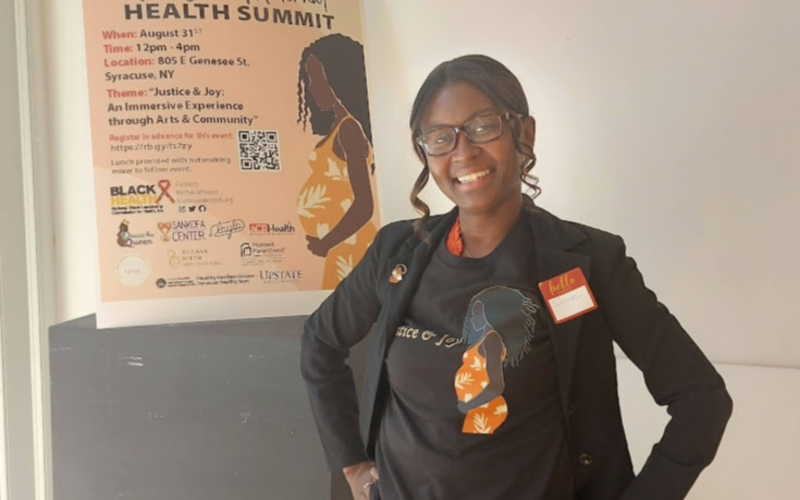Alum Continues Efforts to Eliminate Health Disparities

Simone Seward received her DrPH from UAlbany in 2022 after completing a doctoral fellowship with the Center for the Elimination of Minority Health Disparities, which offers a compensated fellowship for students who want to pursue a doctoral degree in any academic program that the university has to offer, while simultaneously receiving transdisciplinary training in health disparities. We recently caught up with Seward to find out where her career has taken her in the two years since she completed the program.
What first made you want to pursue a career in public health?
"I first became aware of the field of public health when I took a course in my sophomore year of undergrad called Introduction to Community Medicine, where I first heard the story of John Snow and the London cholera epidemic. This introductory course was far more fascinating and interesting than my premed requirements. I wanted to learn more about epidemiology and signed up for additional courses. The more I learned the more I wanted to learn, so I decided to change my major to health and society. My internship between my junior and senior year working on maternal and child health disparities solidified my path and my desire to pursue a Master of Public Health degree."
Tell us about your current position and how it relates to your work on health disparities?
"I am currently the Faculty Director for Community Engaged Learning at SUNY Upstate Medical University. Community Engaged Learning is a teaching strategy I use to integrate academic learning with ongoing, structured community engagement. In the context of medical education, CEL can transform the students’ learning process to actively engage with the community to first learn from its members not only about their lived experiences, but also about the assets and resources that can be leveraged to then serve their needs and improve patient outcomes. At Upstate Medical University, students are required to complete a minimum of 40-hours of Community Engaged Learning, which is different from volunteering because we structure it around specific learning objectives and curricula that also require critical reflection to allow the students to make meaning of their experiences or develop new knowledge and information about their future patients. This is especially important in medical education because of the emphasis placed on understanding the patient in the context of their environment, both social and physical."
In your opinion, what are some of the most effective ways for public health professionals to engage with the communities they serve?
"From my experience as a public health professional working in and with many different communities, the most effective way to engage is to first learn about yourself and the spaces you occupy. By being introspective and reflective about how you show up in the community (even as an organization) can tell you a lot about how you will be perceived. If you view the community as a problem to be solved, you may not be taking stock of the assets in the community; you may only see their needs. The second strategy I typically recommend is to spend time in the community among the people. Spending time listening to their stories and experiences. Their hopes and dreams can tell you so much more than going in with a preset agenda. Get to know who their credible messengers are, go to community events, learn about the community dynamics and nuances that can either be helpful or harmful to the work you are trying to do. And lastly, treat the community as a long-term partner not just a subject to use when you need a letter of support for a grant application. Involve them from the beginning in any interventions or plans you have for their community."
Do you have any suggestions for current MPH or DrPH students who want to get involved in community advocacy, but aren't sure where to start?
"The first place to start would be to get involved in existing advocacy efforts already underway in a specific community. Learn about what the priorities of that community are and what organizations are already doing the work and then join in those efforts to increase the capacity of that organization. You can help with a letter writing campaign, or by writing legislative or policy briefs about a particular issue affecting that community. Take courses, seminars or workshops in community advocacy or community-based participatory research methodology to develop the skills to effectively advocate for community health. Also, remember you can start small by using your field placement or internships to affect organizational change. For example, instead of always meeting on campus, suggest that meetings take place at a community center. Be visible in the community and build authentic relationships."
Are there any projects you are currently working on that you'd like to share with us?
"I am involved with several different projects but the one that I’m most passionate about is the Black Maternal Health Collective that I’ve been involved with for the past year. We have identified the major players in Syracuse, NY who are actively doing the work of addressing health disparities for Black and Brown birthing people. We are formalizing our collective, leveraging existing resources, and developing a strategic action plan that will not only energize our members (because this work does become draining), but also to create community spaces for our Black and Brown birthing people to be able to tell their stories in a variety of formats and artistic expressions. Last August, we kicked off our first ever Black Maternal Health Summit in Syracuse entitled Justice and Joy: An immersive experience, which featured local community members bravely telling their birth stories while surrounded by a village of supporters, doulas, community advocates, and family members. It was such an emotional yet uplifting experience, we are in the planning process for this year’s Summit. It is electrifying and fulfilling work."


